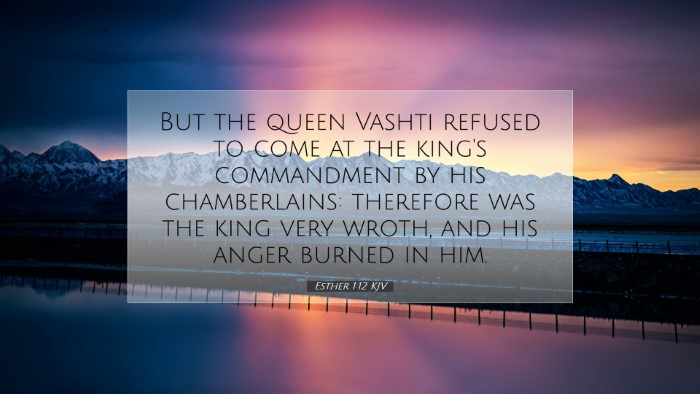Old Testament
Genesis Exodus Leviticus Numbers Deuteronomy Joshua Judges Ruth 1 Samuel 2 Samuel 1 Kings 2 Kings 1 Chronicles 2 Chronicles Ezra Nehemiah Esther Job Psalms Proverbs Ecclesiastes Song of Solomon Isaiah Jeremiah Lamentations Ezekiel Daniel Hosea Joel Amos Obadiah Jonah Micah Nahum Habakkuk Zephaniah Haggai Zechariah MalachiEsther 1:12
Esther 1:12 KJV
But the queen Vashti refused to come at the king's commandment by his chamberlains: therefore was the king very wroth, and his anger burned in him.
Esther 1:12 Bible Commentary
Commentary on Esther 1:12
Bible Verse: "But Queen Vashti refused to come at the king's commandment by his chamberlains: therefore was the king very wroth, and his anger burned in him." (Esther 1:12)
Introduction
The refusal of Queen Vashti to obey King Ahasuerus' command is a pivotal moment in the book of Esther, signifying deeper themes of power, gender, and divine providence. This commentary draws upon public domain sources including Matthew Henry, Albert Barnes, and Adam Clarke to explore the implications of this event in both historical and theological contexts.
Exegesis of the Text
The narrative in Esther begins by setting a scene of extravagance and authority. Vashti’s refusal is not merely an act of disobedience; it represents a clash of wills that unfolds within a patriarchal society.
Historical Context
- Matthew Henry's Insight: Henry discusses the social customs of the Persian Empire, suggesting that Vashti’s act was not only courageous but redemptive. Her defiance reflects the complex positioning of women within ancient monarchies, where their value often rested on their subservience.
- Albert Barnes Commentary: Barnes contextualizes this within the grandeur of the king’s feast, portraying it as a public display intended to reinforce Ahasuerus' authority. The king's demand was representative of the expectations placed on women in his court, to be obedient and accommodating.
- Adam Clarke's Analysis: Clarke extends this discussion to the moral implications, arguing that Vashti’s stand against moral degradation in favor of dignity and respect should be acknowledged. He notes that her rejection of the king's command was not born out of rebellion but an assertion of her own worth and value.
Theological Implications
Esther 1:12 raises several theological themes that warrant exploration, including authority, submission, and the role of providence in human affairs.
Authority and Submission
- Matthew Henry: He emphasizes that while submission is a biblical principle, it is not absolute in situations that require moral courage. Vashti’s refusal can be seen as a form of righteous dissent against an unjust demand.
- Albert Barnes: Barnes reflects on the nature of authority, noting that even rulers can issue commands that are inappropriate. He suggests that the king's reaction reveals his inability to reconcile his authority with Vashti’s autonomy.
- Adam Clarke: Clarke points out the potential consequences of absolutism and the need for discernment in obedience, underlining the importance of mutual respect in relationships, including those between rulers and subjects.
Divine Providence
- Matthew Henry: He argues that this incident was orchestrated within God’s larger plan for His people. Vashti’s refusal sets the stage for Esther’s rise, illustrating how God can use human actions for divine purposes.
- Albert Barnes: Barnes notes that the unfolding drama of Esther is rooted in God’s providential care for His people, implying that every act of disobedience may serve a greater good.
- Adam Clarke: Clarke emphasizes the role of divine intervention in human affairs, suggesting that even in the midst of a king's wrath, God’s plan remains sovereign and unassailable.
Application for Today
This passage offers profound insights for contemporary readers, especially for pastors and Bible scholars who seek to apply biblical principles within our modern context.
Empowerment of Women
- Reflecting on Vashti’s courage encourages discussions about the empowerment and dignity of women in the church and society. This text can be a catalyst for challenging the status quo and advocating for equality.
- The implications of standing firm in one’s convictions, especially when under pressure, resonate with current issues surrounding leadership and morality in ecclesiastical spheres.
Leadership and Authority
- Pastors and leaders can draw from this narrative to examine their authority and the responsibility that comes with it. Reflecting on how authority is exercised fairly and justly is critical in spiritual leadership.
- The balance between obedience and moral choice is a catalyst for ethical discussions within ministry, raising questions about when to obey and when to resist.
Trust in Divine Plan
- The overarching message of divine providence can encourage believers to trust in God’s ultimate plan, especially in times of uncertainty and moral dilemma.
- This encourages believers to remain faithful amidst trials, believing that their actions, in line with righteousness, contribute to God’s purpose.
Conclusion
Esther 1:12 is a rich text filled with layers of meaning and application. Vashti's refusal to obey King Ahasuerus not only serves as a dramatic narrative turning point but also speaks to broader themes of authority, morality, and divine sovereignty. The insights gathered from various commentators reveal the depth and relevance of this passage for contemporary readers, especially within the church context. Encouraging reflection on the complexities of obedience, the dignity of women, and the assurance of divine providence remains vital as believers navigate their faith in a challenging world.


